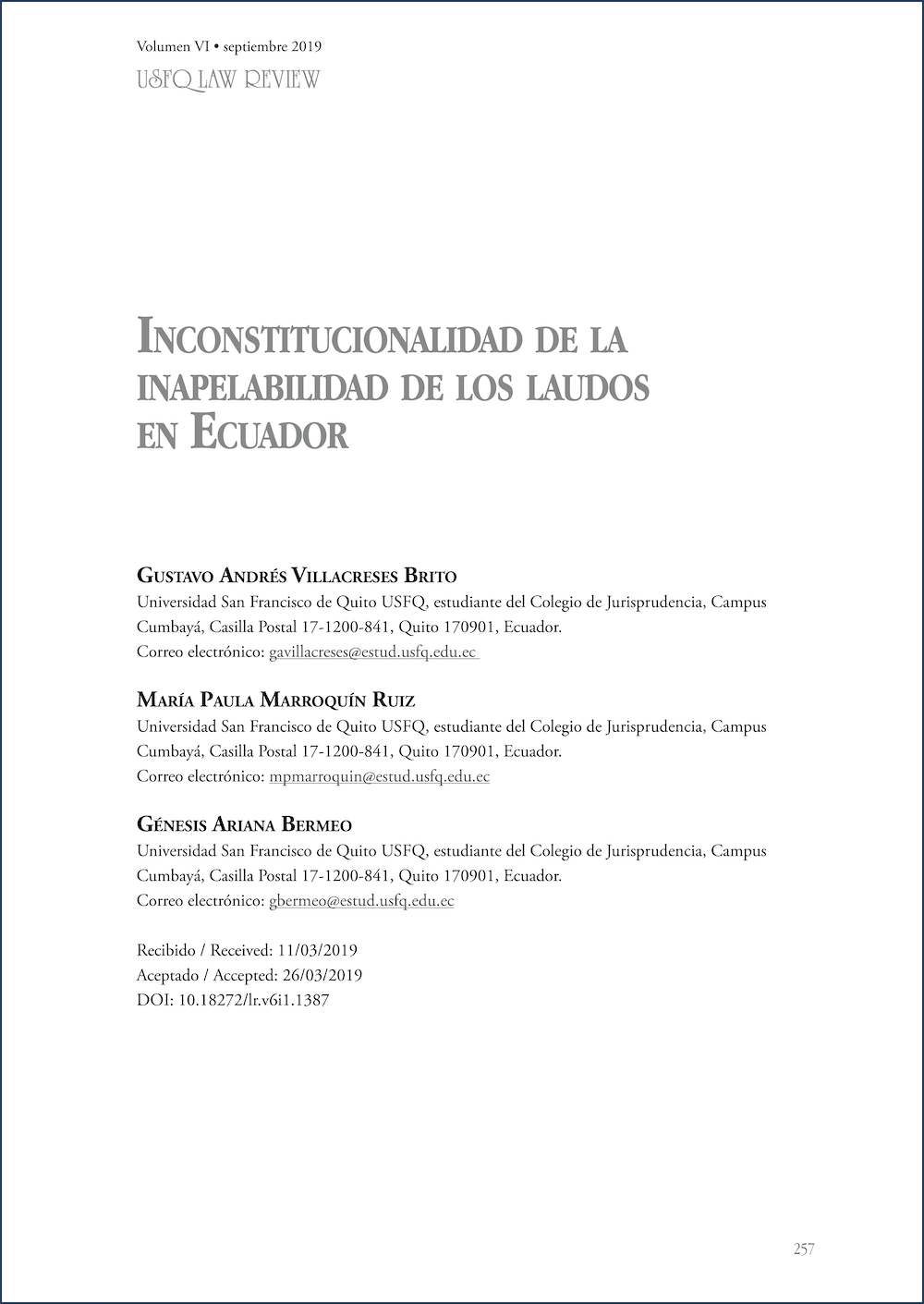Unconstitutionality of Non-Appealability of Awards in Ecuador
DOI:
https://doi.org/10.18272/lr.v6i1.1387Keywords:
arbitration, Ecuador, award, unconstitutionality, appealability, non-appealability, Law of Arbitration and Mediation, right of appeal, right to appealAbstract
The State has various powers, including the power to administer justice. A transversal axis in this exercise is the right to due process, which contains the right to defense. The latter includes the fundamental guarantee of right to appeal the decision. However, not only the State has sought to exercise these faculties, but at the same time individuals have organized themselves for the private institutionalization of justice. The result is the existence of alternative dispute resolution. One of these methods is arbitration. It has been specifically regulated in the Ecuadorian legislation by the Statute of Arbitration and Mediation. However, this statute has restricted the right to appeal the awards. This prohibition has been supported by the Constitutional Court through three main arguments that have been exposed in the acquittal of constitutional consultations. This paper will analyze the validity and coherence of these arguments used to defend the constitutionality of this limitation. The first argument states that the prohibition is legitimate because is done through a statute, but it neglects constitutional supremacy. The second, defends an alleged lack of jurisdictional authority in arbitration, but it does not consider that Ecuadorian law has recognized the jurisdictional and public service nature of arbitration. Finally, the third argument states that, through the arbitration agreement, parties assume a waiver of the right to appeal the award, but it forgets that constitutional rights are inalienable. As a result, the constitutionality of the non-appealability of the awards in Ecuador is in doubt. Finally, it is recommended as an alternative, the creation of a system of appeal courts inside arbitration, to preserve its private nature but without ignoring its jurisdictional nature.
Downloads
References
Agudelo Ramírez, Martín. "El Debido Proceso". Opinión Jurídica 4/7 (2005).
Caivano, Roque. Arbitraje. Buenos Aires: Editorial Ad Hoc, 1993.
Cevallos Izquierdo, Diego. La doble instancia como garantía constitucional del contribuyente. Tesis de Maestría. Universidad Simón Bolívar, 2015.
Código Orgánico de la Función Judicial. Registro Oficial Suplemento No. 544 de 9 de marzo de 2009.
Constitución de la República del Ecuador. Registro Oficial No. 449 de 20 de octubre de 2008.
Convención de Nueva York sobre el reconocimiento y la ejecución de Sentencias arbitrales extranjeras (1958).
Corte Constitucional del Ecuador - Período de Transición. Caso No. 1568-1 0-EP. Sentencia No. 169-12-SEP-CC.
Corte Constitucional del Ecuador. Caso N.° 0091-13-SEP-CC. Sentencia N.° 081-13-SEP-CC.
Corte Constitucional del Ecuador. Caso N.° 1114-12-EP. Sentencia N.° 173-14-SEP-CC.
Corte Constitucional del Ecuador. Caso N° 0535-12-CN. Sentencia N° 001-13-SCN-CC.
Corte Constitucional del Ecuador. Caso No. 0213-10-EP. Sentencia No. 055-10-SEP-CC, 10 de Enero del 2011.
Corte Constitucional del Ecuador. Caso No. 0499-11-EP. Sentencia No. 0045-13-SEP-CC, 31 de julio de 2013.
Corte Constitucional. Caso N.° 0141-14-CN. Sentencia N.° 007-16-SCN-CC de 28 de septiembre de 2016.
Couture, Eduardo. "Prólogo a la obra póstuma de Agustín A. Costa, 'El recurso ordinario de apelación en el proceso civil'". Buenos Aires, 1950.
Devis Echandía, Hernando. Teoría General del Proceso. Buenos Aires: Editorial Universidad de Buenos Aires, 1997, p. 505. En Sempértegui Vallejo, Leonardo. Necesidad de la implementación de la segunda instancia o apelación en arbitraje. Revista Ecuatoriana de Arbitraje 6 (2014).
Expediente 0689-2000-AA. Citado en Insignares, Silvana. Construcción constitucional del proceso de integración suramericano. Bogotá: Universidad del Norte, 2015.
Font Serra, Eduardo. Aportaciones del profesor Font Serra a la doctrina jurídica. Madrid: Ministerio de Justicia, 2004.
Garrido, Therina. La paridad de género en el sistema electoral mexicano: límites y alcances de las medidas de acción afirmativa en sede judicial. Salamanca: Ediciones Universidad de Salamanca, 2016.
Gil, Jorge. Nuevo Régimen de Arbitramento. Bogotá: Cámara de Comercio de Bogotá, 1999.
Gomez Jene, Miguel. The Arbitration Agreement: Status Quo. Cuadernos de Derecho Transnacional 9/2 (2017).
Gómez, Carlos. La Dogmática Jurídica como Ciencia del Derecho. Bogotá: U. Externado de Colombia, 2011.
Gonzales de Cossío, Francisco. Sobre la Naturaleza Jurídica del Arbitraje, Homenaje a Don Raúl Medina Mora. http://www.gdca.com.mx/PDF/arbitraje/SOBRE%20LA%20NAT%20JDCA%20ARBITRAJE%20Hom%20%20Raul%20Medina.pdf (acceso 03/05/2018).
Kamada, Luis. La frontera entre el derecho de defensa y la garantía al debido proceso, 2003. https://www.justiciajujuy.gov.ar/escuela-de-capacitacion/images/Doctrina_Local/DERECHO_A_RECURRIR_-_Luis_E_Kamada.pdf (acceso: 09/05/2018)
Ley de Arbitraje y Mediación. Registro Oficial No. 417 del 14 de diciembre de 2006.
Ley Modelo de la Comisión de las Naciones Unidas para el Derecho Mercantil Internacional sobre Arbitraje Comercial Internacional (1985).
Ley Orgánica de Garantías Jurisdiccionales y Control Constitucional. Registro Oficial No. 52 de 22 de octubre de 2009.
Pacto de San José de Costa Rica (1969).
Pacto Internacional de Derechos Civiles y Políticos (1966).
Perez Nieto, Leonel. Tratado de arbitraje comercial internacional mexicano. México D.F.: Editorial Limusa, 2013.
Pérez Pacheco, Yaritza. Reconocimiento y Ejecución de Laudos Arbitrales Comerciales Internacionales en México. México D.F.: ILEJESC, 2014.
Quinche, Manuel. La acción de inconstitucionalidad. Bogotá: Siglo del Hombre Editores, 2015.
Rogel Vide, Carlos. Del convenio arbitral y sus efectos, p. 53. En Díaz-Bastián, Ernesto. Comentarios breves a la
Ley de arbitraje. Zaragoza: Editorial Reus, 2007.
Salcedo Flores, Álvaro. En torno a la naturaleza jurídica del arbitraje. Bogotá: Revista Análisis Internacional, 2010.
Sentencia C-582 de 1999. MP. Alejandro Martínez. Citada en Molinares, Viridiana. Notas sobre constitución, organización del Estado y Derechos Humanos. Barranquilla: Universidad del Norte, 2014.
Vivanco, Ángela. "Capítulo VIII: Tribunal Constitucional". Curso de Derecho Constitucional: Tomo III. Santiago: Ediciones UC, 2014.

Published
How to Cite
Issue
Section
License
In relation to copy rights, authors publishing with USFQ Law Review know and accept its internal policies, including but not limited to:
1. Open Access Policy.
2. Authorship Policy.
3. Copyright Policy.
4. Pre-Publication Policy.
5. Post-Publication Policy.
6. Intellectual Property Protection Policy.
7. Digital Preservation Policy.

